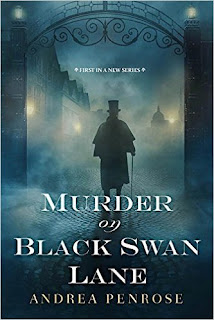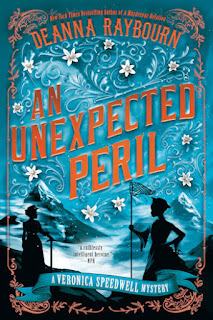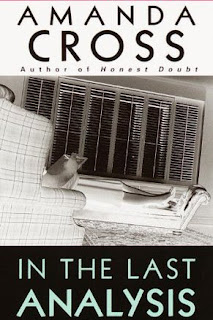I've always liked mysteries, but until recently I don't think I'd have described myself as a mystery reader. Looking at the stats (since I keep stats) almost exactly half of the books I read this year were mysteries and mostly historical mysteries at that. That's between 47 to 49 mysteries — depending on what you count as a mystery — and 48 non-mysteries in mid-November 2024.
I liked mysteries — especially mysteries set in England, between World War I and World War II — enough that I ended up working on a post-war themed mystery in my own sci-fi universe. Certainly at the moment when I need something easy to read a mystery tends to be my first choice.
Given all of that, and the sheer bulk of mystery books I've read, I thought I'd write up a little thing about what I've read and which ones I've really enjoyed. I'm including them more-or-less in the order I read the first entry of the series this year. I've tried to keep spoilers to a minimum.
Ruth Galloway Mysteries — Elly Griffiths
I can't explain why I like the Ruth Galloway mysteries. The crimes (especially the early entries) are often child-related or child threatening, which is usually a non-starter for me. The characters are interesting, but tend not to exhibit growth, or fall back from growth and can sometimes be a little repetitive over the course of 14 books. That may be a human condition, but a crux of the series is that the two leads have literally not sat down and used their mouth-words with each other for a decade, much to the irritation of their 10 year old child...
The university angle is nice and dealing with the frustration of your department head not doing what you want, or being the department head and not being able to do what everyone wants, feels very real.
Wrexford & Sloane — Andrea Penrose
The Wrexford & Sloane books are fun. They're regency era mysteries, which are much more about the people solving the crimes than they are anything to do with the crimes themselves — I cannot remember a single crime in the books. Mostly they're on the romance of chemist-lord and satirical-cartoonist, plus their rag-tag band of sometimes literal kids-in-rags. I'm not sure if this the narrator for the audio books I've been reading or the author, but the word choice is sometimes a little repetitive and odd, but they're always engaging adventures.
Harbinder Kaur — Elly Griffiths
The Harbinder Kaur mysteries are notable for only occasionally featuring Harbinder. If you like Elly Griffiths's writing then these are a good example, although I found they didn't have the same connection of character that the Ruth Galloway books did. The best is probably "Bleeding Heart Yard", although the ones that don't feature Harbinder, but do feature the weird band of secondary characters are certainly worth a read as well.
Veronica Speedwell — Deanna Raybourn
I love these books because they have the loosest variation of historical you can possibly put in mystery. In fact I'm not even sure they count as mystery so much as alt-history-fantasy-romance, but if all powerful lepidopterist of mysterious origins and her Lordling Taxidermist love interest are your thing, then these are your books. I love them for being very weird, but comfortable with that weirdness.
Kate Fransler — Amanda Cross
I think I started reading the Kate Fransler books sometime while I was in undergrad, and the mystery with a university background, has really appealed to me. (See Ruth Galloway). Mostly driven by the Ruth books, I reread "In the Last Analysis" and it's a fun mystery. It does feel a little bit like a book written by an English prof who looked at a mystery and said, I can can do that better.
Inspector Ian Rutledge — Charles Todd
The Rutledge books do a lot for me because they're set all over post-World War I Britain which just makes me happy. On the other hand they do tend to be slightly different arrangements of irascible suspicious small town locals, antagonizing and antagonized by the big bad detective inspector from Scotland Yard. There are a lot of interesting elements in the post-Great War themes, but these always just feel nodded to and not addressed. I'd love these a little more if the bigger series plots and themes got more air time.
Lord Peter Wimsey — Dorothy L. Sayers
I love the Lord Peter books and of the Queens of Crime, Sayers is my favourite. Lord Peter is savvy — and genre savvy — but human and concerned with humanity as much as he is by justice. There's also something about the way Sayers writes characters that I find really appealing. Her themes of cause and consequence makes her mysteries feel real and important. I read "Whose Body?" to be a little more critical and analytical about how she writes, but then got distracted enjoying it. Oh well, I guess I'll just have to read it again.
Lady Darby — Anna Lee Huber
The Lady Darby mysteries are, to some extent, the opposite of the Veronica Speedwell ones. Where everything for Miss Speedwell is set to eleven, Lady Darby is set to a much more sedate and carefully illustrated six. They're written with much more realistic characters, situations, crimes and settings, although they are very compelling and Huber's writing really appeals to me. Character again is the real standout in these books, but the mysteries are engaging and well set and make sense.
The Last Policeman — Ben H. Winters
This is one of the books where I'm not sure it's a mystery, partly because it's set in the literal apocalypse where the validity of investigating the crime is the key question. The first book "The Last Policeman" didn't quite click with me so I haven't continued in the series, but people I trust say it's good, so I might continue at some point.
Lady Sherlock — Sherry Thomas
I love the Lady Sherlock mysteries. I think the earlier books were stronger and the series shows why you need to be careful with an overarching villain to your mysteries. (You will at no point be surprised about who masterminded the crime of each). Granted I also much prefer the Sherlock Holmes stories where Moriarity doesn't feature.
In the Lady Sherlock mysteries, I love the view into the minds of people with very different mindsets and I also love how super powers are quite possible provided you have a large enough group of people bringing enough skills together to make things happen.
Chief Inspector Armand Gamache — Louise Penny
As Canadian as possible, under the circumstances. To be fair, M. Gamache would probably not be terribly thrilled to be described that way, but these books channel my memories of CBC radio and the sophisticated, rustic milieu which Canada used to present to the world.
The characters are intense and realistic and the crimes (despite for some reason always happening to the same six people — I'm early in the series still) are passionate and sensible.
As with the Lady Sherlock books, I think having an overarching villain cross too much of your mystery books detracts from the story at hand, but the setting and the people really drew me in.
The Angel of the Crows — Katherine Addison
Katherine Addison is one of my favourite writers and "The Angel of the Crows" is very interesting. Imagine if Sherlock Holmes was an angel, and thus had no internal access to humanity. Of all the Sherlock Holmes inspired books I've read by people other than Conan Doyle, I think this is my favourite. It's engaging, set in a very interesting Victorian Fantasy world, and the relationship between Holmes and Watson is very interesting to watch unfold.
Daisy Dalrymple — Carola Dunn
I'd tell you that the Daisy Dalrymple books are like popcorn, but I don't care for popcorn that much, so maybe more like potato chips... Anyway, my point is that I was reading these at the rate of about one a day for a good chunk of May. It seemed like every time I listened to one it just evaporated.
Inter-war, English, spirited protagonist, good — if simple — characters, these really landed in the sweet spot of readability for me. I did eat ... read ... a few too many and so I've slowed down on them a bit, but worth while and pretty well constructed mysteries as well.
Albert Campion — Margery Allingham
Margery Allingham was the member of the Four Queens of Crime, I knew the least about. "The Crime at Black Dudley" didn't really grab me the way "Whose Body?" did, partly because it seemed much more focused on the crime than the character and partly because the crime itself didn't make a lot of sense to me. I'll need to revisit it at some point.
Verity Kent Mysteries — Anna Lee Huber
The Verity Kent mysteries are interesting. Of all of the mystery books I've read this year "This Side of Murder" was the one that surprised me the most, both by its plot and its organization. I wasn't quite sure what to make of it, but following books in the series have solidified it as really worth reading.


















No comments:
Post a Comment